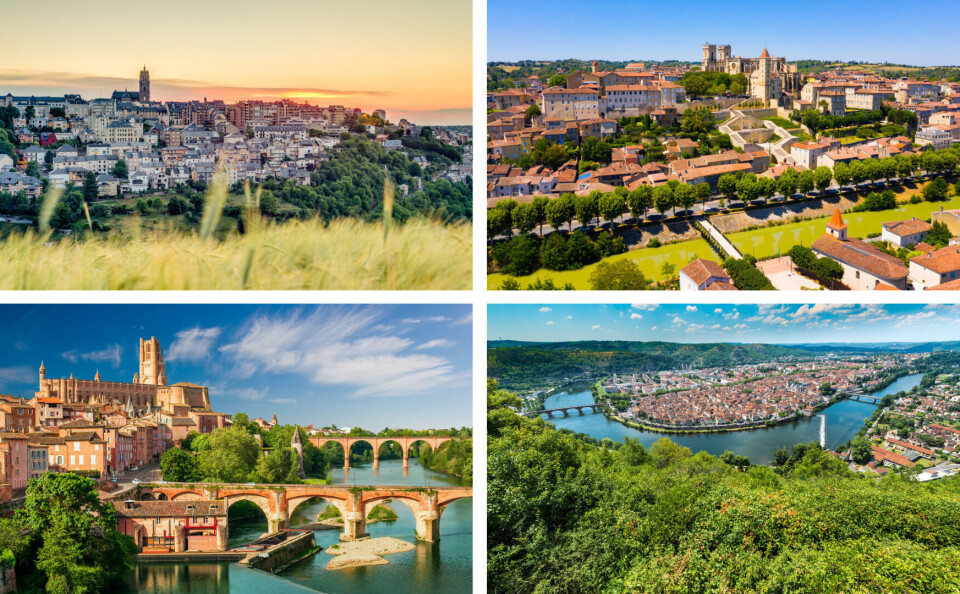-
Ryanair confirms routes to Dole-Jura airport maintained in summer 2026
Airline previously said that more routes to France will be axed next year
-
Explosion at chemical plant near Lyon: where are other ‘at risk’ sites in France?
An estimated 2.5 million people live within a kilometre of a French Seveso site
-
Farmer blockades to continue on motorways over Christmas in south-west France
Protests are being maintained on the A64, A83 and A63 and on departmental roads
Where are the best places to grow old in France?
Is your region on the list? The south-west did particularly well in the ranking

Rodez, a small city in the south-west, has been ranked the best place to grow old in France, in a new list that compared 449 towns using criteria including life expectancy, pollution levels, and access to doctors.
Newspaper Le Figaro released its new ranking today (November 23). It compared small cities and towns with more than 20,000 inhabitants, to see how positive of a place they are to grow old.
The top five were:
Overall, towns in the south-west of France did best.
Rodez on top
Upon learning of the win, the mayor of Rodez, Christian Teyssèdre, said: “In Rodez, we never want to leave anyone behind, especially seniors.”
Healthcare
Rodez is well-supplied from a health perspective; it has a respectable 3.28 cardiologists per 10,000 people, and 0.68 at-home care workers per 1,000 residents aged 75 or over. It also has one of the largest selections of pharmacies in the country, at 5.74 per 10,000 residents.
Mr Teyssèdre explained that “to keep doctors in the area”, the town had built five health centres in the past six years, at a cost of €20 million. “So we're effectively plugging the gap when older doctors retire,” the mayor said.
Sports
Its older residents are also relatively active; 18.2% of people aged 60 or over are enrolled in a sports club of some kind, and a third (33.2%) take part in some kind of group sporting activity.
“People from Rodez take up sport when they’re little and then continue it all their lives,” said Mr Teyssèdre.
Pollution
Rodez also scored well on pollution levels, with an average level of 2.04 ug/m3 for PM10 particles, which are some of the most damaging to health.
The mayor said that pollution levels had “dropped 18% in 10 years in the centre of town”, which he said was due to policies designed to increase public transport (particularly bus) usage, more pedestrianisation, and the building of larger car parks. This stops people driving around and idling in town “for hours, looking for a place to park”, he said.
South-west wins out
The south-west of the country did particularly well in the ranking, with 13 of the top 20 places taken by towns in Nouvelle-Aquitaine and Occitanie.
Five Occitanie towns take up half of the top 10, with Auch (2nd), Cahors (3rd), Albi (4th) and Millau (8th). Blagnac (11th) and Muret (17th), both in Occitanie, also scored well.
Carole Delga, President of the Occitanie Regional Council, said: “Food, access to healthcare, environmentally-friendly mobility, quality of life: the region is doing everything it can to offer its residents a healthy and sustainable lifestyle, and to make Occitanie a region where life is good. So I'm delighted to see it so well represented in this ranking.”
Longevity
People in the south-west region have particularly high longevity. For example, in Gers, life expectancy at 60 is 28 years for women and 23.7 years for men (one of the highest figures in France).
Sports
In Auch - but also in the nearby smaller towns of Colomiers, Blagnac, and Tournefeuille - the over-60s are among the most active in France. Between 18% and 25% of them are members of sports clubs, compared to just 6.5% in Paris and just over 9% in Marseille.
Health
Healthcare access is also good. In Cahors, Rodez and Tarbes, for example, there are more than five pharmacies for every 10,000 inhabitants, compared with less than three per 10,000 in most towns in the Paris region.
Cahors also has good access to emergency services and to GPs (18.3 per 10,000 inhabitants aged 15 and over), private nurses (29.27 per 10,000 inhabitants) and physiotherapists (21.83 per 10,000 inhabitants).
Perpignan, also in Occitanie, did well due to the number of beds for the elderly, including in Ehpads (elderly care homes) and long-term care units: there are 123 per 1,000 people aged over 75, compared to 72 in Strasbourg and Nantes.
Ms Delga added that the region has also been working hard to open new health centres, and recruit more doctors and medical professionals, through the Ma Santé Ma Région scheme.
Ranking criteria
Judges used 22 criteria across five categories to rank the 449 towns.
The categories were:
-
Pollution levels
-
Incidence of serious illnesses - including cancer, cardiovascular and respiratory problems, cancer, neurological and degenerative conditions, and diabetes
-
Access to healthcare professionals, including urgent care, pharmacies, GPs, at-home care, and the number of specialists and nurses per person
-
Life expectancy levels at age 60
-
Sports practice levels among people age 60 and over
-
Data came from national sources including Insee (Institut national de la statistique et des études économiques), Drees (Direction de la recherche, des études, de l'évaluation et des statistiques), and the Assurance maladie.
All towns on mainland France with more than 20,000 inhabitants were included, except for the Corsican cities of Ajaccio and Bastia, for which data was lacking in some areas.
See the full list and more details on the criteria used on the Le Figaro website here.
Related articles
Top 100 ranking: The healthiest towns or cities in France to live in
MAP: France’s most welcoming towns and villages
Where in France are people happiest - and what makes them happy?
























